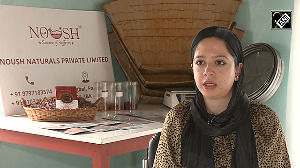Under the terms of the deal announced on Monday, Redwood Shores-based Oracle will pay $10.66 per share in cash or stock for Siebel, whose products help manage companies' relations with customers.
The price represented a 17 per cent premium from Siebel's market value entering Monday. Despite four years of flagging fortunes, Siebel still has $ 2.24 billion in cash, reducing Oracle's net takeover cost to $3.6 billion.
Shares of San Mateo-based Siebel rose $1.16, or nearly 13 per cent, to close at $10.29 during late afternoon trading on the Nasdaq Stock Market, where Oracle's shares gained 21 cents to finish at $13.49.
The deal accelerates the drive by Oracle Chief Executive Officer Larry Ellison to overtake SAP as the world's largest maker of business applications software, which automates a wide range of administrative tasks.
In the past nine months, Oracle has either completed or announced five takeovers in the field, an expansion that has cost more than $17.6 billion. Among the acquired was PeopleSoft Inc, which, like Siebel Systems was run by a former Oracle executive who had developed a frosty relationship Ellison.
For its part, SAP downplayed the significance of Oracle's latest conquest. "Oracle is in the business to buy customers. Ours is to service customers," said SAP spokesman Tony Roddam.
| |||||||||||
Industry analyst Richard Williams of Garban Institutional Equities predicted that Oracle would lay off more than 2,000 workers, based on the percentage of jobs the company eliminated after devouring PeopleSoft, which had about 11,000 employees. Oracle fired 5,000 workers after that deal.
Oracle executives acknowledged that layoffs are likely but didn't provide specific projections in a Monday conference call.
Oracle's intensifying focus on business applications software largely reflects the slowing growth of its database product line, which accounts for more than three-fourths of the company's sales.
Ellison also wants to deepen Oracle's stack of technology products to compete with two other longtime rivals, Microsoft Corp and IBM Corp.
"Oracle was behind the curve so it needed to buy some big headline-making companies and feed off their technology," Williams said. "They really didn't have much choice, unless they wanted to see their stock price cut in half. They needed to keep their sales growing, and to do that, they need to cannibalise smaller companies."
The big question now is whether Oracle has bitten off more than it can chew, said Octavio Marenzi, CEO of Celent, a technology consultancy. "Mergers are always difficult, so doing so many at once only compounds the difficult," he said. "This appears to be an unduly risky strategy."
AMR Research analyst Jim Shepherd believes Oracle can pull it off, primarily because the PeopleSoft takeover has gone more smoothly than most industry experts anticipated.
Ellison began preparing for a software industry shakeout in 2003 when he drew up a list of potential takeover targets topped by PeopleSoft and Siebel Systems, according to documents released in an anti-trust trial in 2004.
Oracle first stalked PeopleSoft, launching an 18-month takeover battle that culminated in a $11.1 billion acquisition in December 2004.
That deal pitted Ellison against one of his former Oracle lieutenants, Craig Conway, who spearheaded PeopleSoft's staunch resistance to the takeover bid until he was fired a few months before the two sides negotiated a truce.
The US Department of Justice tried to derail Oracle's bid for PeopleSoft, arguing that the combination would stifle competition. But a federal judge brushed aside the government's objections and cleared the deal, making it unlikely regulators will oppose Oracle's takeover of Siebel Systems, which is much smaller.
European regulators also must approve the takeover.
Siebel Systems is run by Tom Siebel, who has occasionally sniped at his former boss since leaving Oracle and starting his own company in 1993.
But Tom Siebel, who is his company's chairman and largest individual shareholder, welcomed Oracle's takeover offer, calling it a "wonderful, exciting event" during Monday's conference call.
In the same call, Ellison said Siebel, 52, is expected to remain with Oracle for a few years, but didn't provide specific details. Siebel is in line to pocket nearly $600 million by selling his Siebel Systems stock to Oracle.
Siebel Systems has been shrinking since 2001 amid weakening demand for its main product - customer relationship management, or CRM, software that helps companies analyse their sales patterns and market their products.
The niche accounts for about $3.5 billion in new software sales annually according to Gartner Inc., but Siebel Systems has been losing market share to SAP, Oracle and an Internet startup, Salesforce.com Inc.
"Siebel could see the writing on the wall and knew the time had come to make a deal," said Yankee Group analyst Tom Dwyer.
Siebel's annual revenue has plunged from a peak of $2.1 billion in 2001 to $1.3 billion in 2004, a slump that has dragged down the company's stock from its highs of more than $100 per share.
Hoping to turn things around in 2004, Tom Siebel stepped down as the company's CEO and turned over the reins to a veteran IBM executive, Mike Lawrie.
But sales continued to falter, prompting the company's board to oust Lawrie in April and replace him with George Shaheen, an executive best known in Silicon Valley for overseeing the expensive demise of online grocer Webvan Group Inc.






